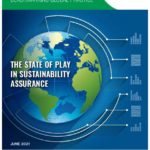Calling time on sustainability reports that have not been
independently assured, FEE stresses that assurance provision is
essential to the future credibility of sustainability reporting.
Currently more than half of all sustainability reports are issued without independent assurance. This is an unacceptable fact. It limits stakeholder confidence and the potential
impact of sustainability reporting.
Today FEE is launching a publication focused on the need for assurance provision. The publication Benefits of Sustainability Assurance explains what is meant by the term assurance and why an organisation should commission an assurance engagement.
FEE has long supported the development of sustainability reporting. The advantages are clear: it supports a prudent, long-term view; and facilitates a better understanding of
non-financial risk. Sustainability reports address a broad range of issues (e.g. corporate governance, environmental and corporate social responsibility). It should be obvious to
reporters and users that for sustainability reporting to become widely accepted and reliable its credibility must be of a sufficiently high level.
The voluntary nature of sustainability reporting means that sustainability reports can vary widely in scope and content. This situation can lead to misleading information. That
is why FEE is calling on all companies issuing a sustainability report to also obtain independent assurance on the report.
Furthermore, there can be confusion regarding the level of assurance provided. Stakeholders must be adequately informed about the method used for the assurance engagement, in order to avoid creation of an expectation gap. If credible assurance is to be delivered, the independent assurance provider will usually need to work in a multi-disciplinary
team, due to the broad nature of the assurance task.
Commenting on the paper, FEE President Mr. David Devlin said: The relevance of non-financial reporting continues to grow. Key stakeholders, such as fund managers increasingly use sustainability reports for their financial decision-making.It is essential, therefore, that reporting companies raise stakeholder confidence by demonstrating their desire to enhance the quality and credibility of their sustainability reporting with third party, independent assurance provision.
The independent assurance provider must work with multi-disciplinary teams when providing assurance. Proven reporting expertise combined with expert technical knowledge will further the achievement of generally accepted, high quality sustainability reporting, he added.
Skip to content



